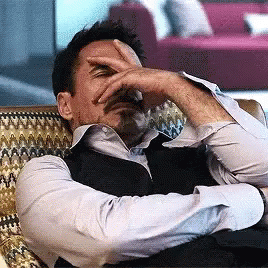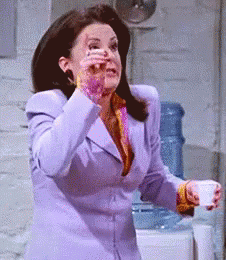The Shame Game
Anxiety is the most common form of mental illness in the United States. Those who have anxiety have a 50% chance of suffering from depression as well. Talk about luck of the fucking draw.
Since there are many types of anxiety and depressive disorders, it can be very difficult to diagnose. Depending on the level of your depression and anxiety, doctors may suggest some adjustments you can make to your daily routine to help improve your overall well-being. Seeking out a therapist, eating healthy, meditating and exercising regularly have been shown to increase your natural serotonin levels. While that sounds like a walk in the fucking park for some, what happens when none of these techniques work and your anxiety is making it difficult to swallow and you have convinced yourself you are in the end-stages of ALS? I warned you that I have issues! Enter one of the most socially-stigmatized, yet life-saving techniques out there: antidepressants.
If you have diabetes, you would take insulin to regulate your blood sugar. If you have high blood pressure, you would take a beta blocker to lower it. If you have cancer, you would try chemo to kill the tumors in your body. Why is it that if you have trauma to the brain or a chemical imbalance through no fault of your own, taking medication to fix it is looked down upon? With 1 out of 5 Americans dealing with some form of mental illness, we are in a life-threatening epidemic with limited resources at our disposal. Suicide is the second leading cause of death for individuals between 10-34, yet many people fail to see it as a major health concern. So where the fuck is the disconnect?
I obviously did a deep dive into this and came up with some alarming ideas. For one, Hollywood and the media have been major culprits in advancing the idea that mental illness is a terrifying and isolating disease. Though it’s getting better, shout out to the HBO drama, Euphoria, many films and television shows use not-so-accurate and, at times, damaging stereotypes to depict certain characters with mental illness. Many times, these films have stars with mental disorders who turn out to be violent, psychopathic killers (i.e.The Joker and American Psycho). It’s worth noting that I actually really enjoy these movies, but regrettably, looking back, also developed negative, preconceived notions on these disorders after watching them.
In Split, the villain, who suffers from dissociative identity disorder (which makes up 2% of the U.S. population), ends up becoming a murdering kidnapper. I mean, I could imagine feeling pretty shitty about your diagnosis if you were compared to that. In the 1960s classic, Psycho, the antagonist, who suffers from schizophrenia and dissociative identity disorder, kills and then impersonates his mother, kills again and, ultimately, becomes a serial killer. Again, not painting mental health in the best light. In one of my favorite Halloween classics, The Exorcist, when that bitch was clearly possessed by the devil, doctors initially suggested she had a severe mental disorder that could be cured with sedation. Comparing symptoms of mental illness to being possessed by the devil seems…extreme, to say the least.
As you can see, Hollywood obviously has some work to do in the empathy department.
Another huge factor that perpetuates the stigma around mental illness is the lack of resources and insurance coverage for mental health-related issues. I am currently prescribed my antidepressant through my primary care doctor because it’s too expensive for me to see a psychiatrist. Out of the approximately 20 doctors I called who were covered under my insurance, NONE of them were taking new patients and I could not afford to pay out-of-pocket. Personally, I would not recommend this approach, especially if you can find a psychiatrist in your network (good luck if you can), since primary care doctors ARE NOT experts in mental health. Last month, my doctor suggested “increasing my antidepressant dosage” because I was experiencing hair loss that he suspected might be due to situational stress. Luckily, I’ve been around the block a few times so I am informed enough to know that upping my dosage for occasional stress is highly unnecessary and seems to be throwing a bandaid on my hair loss situation.
It’s no wonder people are afraid to take antidepressants, let alone seek out help in the first place. Many people, me included, can’t afford simple mental health services so it may not be a priority with the other day-to-day struggles we need to handle in order to keep our shit in order. If the medical community doesn’t consider mental illness on par with other disorders, it makes it that much more difficult for the silent sufferers to come forward.
My Rocky Road
I first started off on Prozac when I was 17 after my first major panic attack. I remember I was brought to a psychiatrist the day after the attack and was instantly put on Prozac with not much choice in the matter. Since I had little-to-no knowledge on antidepressants, I definitely felt “crazy” and thought I was two steps away from being Winona Ryder in Girl Interrupted. Again, thanks Hollywood. It didn’t help that I had absolutely ZERO comfort from my doctor at the time. She had the demeanor of a rock and her sterile room matched her cold personality.
This is why, if you can, test out a few psychiatrists. No matter how many diplomas or 5-star reviews they have, if you are not comfortable, you will not get the most out of your sessions. Quick side note (for those who don’t know): psychiatrists prescribe the medications and therapists help you talk shit out. My therapist, as I’ve mentioned, is a queen and is different from the psychiatrists I mention in this post. I was on Prozac for the next 3 years and was not a fan. My personality felt dulled and I experienced occasional mania, which I didn’t realize until recently.
Simply put, it was not the right drug for me. I went off of it (with the help of my doctor-VERY IMPORTANT) and managed my anxiety for the next 3 years.
Fast forward to 2016, my dog, a.k.a. my favorite creature in the world at the time, died and I reverted right back into the anxiety and depression I experienced in 2010. I was at a loss but knew I needed a little help in the serotonin department. Since I was not going back to Dr. Cold As Ice, my primary care doctor suggested I start on an antidepressant. Since I was desperate, I told her I would try anything BUT Prozac. Side Note: One drug does not fit all. While Prozac did not work for me, it does save many lives. She then suggested Lexapro which I was willing to try because, why the fuck the not? Antidepressants typically take around 4-6 weeks to work, so, unfortunately, you can’t expect to see results immediately. I have now been on Lexapro for 5 ½ years and my mental health has never been better. It doesn’t numb me out and I truly feel like myself-with the edge taken off. I have no plans on going off of it in the near future because it works. And who wants to fuck up a good thing?
The FIne Print
With almost everything in life, there is a cost/benefit analysis and antidepressants are no different. In 2004, the FDA issued a black box warning on antidepressants due to increased suicidal ideation and behaviors in some users. I recently learned that a black box warning is the highest safety-related warning that medications can receive and is implemented when the drug has caused adverse reactions that lead to hospitalizations and death.
A few, out of the over 600, drugs that carry a black box warning are Klonopin, Isotretinoin (Accutane), and Adderall. This is why I would highly recommend a psychiatrist who can walk you through this, at times, overwhelming process. Like finding your soulmate (ew), you might have to test drive a few until you find the right one.
Another important factor that every person who takes medication should know is the side effects of antidepressant withdrawal syndrome. It is EXTREMELY risky to stop your antidepressant cold turkey because of the possible adverse reactions. Once your serotonin receptors get used to the pill, your brain will expect it. If you take antidepressants for a prolonged period of time, you will MOST LIKELY experience “withdrawals” if you don’t wane off of it with doctor supervision. While this is not the same as withdrawing from drugs and alcohol, it does have the potential of making your mental health worse than it was before. Some symptoms of stopping antidepressants cold turkey are anxiety (what else is new), flu-like symptoms, muscle spasms and electric shock sensations (I’m sorry, what?). For me, it only takes missing one day before I start to experience dizziness and fatigue. Honestly, it’s not ideal being this dependent on a drug, but it’s better than the alternative.
Unfortunately, for many, anxiety and depression is a lifelong illness. There is no magic pill, even with antidepressants, that will entirely eliminate your symptoms for good. However, it is reassuring to have some additional help if you can’t seem to kick your anxiety or sadness. We only have one life to live so why not get a little help if you are not feeling the way you deserve.







